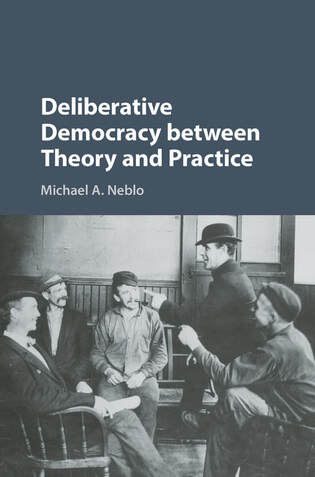|
Deliberative democrats seek to link political choices more closely to the deliberations of common citizens, rather than consigning them to speak only in the desiccated language of checks on a ballot. Sober thinkers from Plato to today, however, have argued that if we want to make good decisions we cannot entrust them to the deliberations of common citizens. Critics argue that deliberative democracy is wildly unworkable in practice. Deliberative Democracy between Theory and Practice cuts across this debate by clarifying the structure of a deliberative democratic system, and goes on to re-evaluate the main empirical challenges to deliberative democracy in light of this new frame. It simultaneously reclaims the wider theory of deliberative democracy and meets the empirical critics squarely on terms that advance, rather than evade, the debate. Doing so has important implications for institutional design, the normative theory of democracy, and priorities for future research and practice. |
"Michael Neblo has written an exemplary book, exhibiting equal measures of philosophical sophistication, methodological rigor, and substantive import. What is more, Deliberative Democracy between Theory and Practice is revelatory, showing the author as a decent, humane thinker. Readers will not just learn from Neblo; I think they will be touched as well."
James Johnson, University of Rochester
"A beautiful introduction to deliberative democracy and a must-read for scholars in the field. Clearly and engagingly written, based on deep theoretical understanding and a set of brilliant experiments, this book clears up a host of misunderstandings about what deliberative democracy is and what it can do for us."
Jane Mansbridge, Adams Professor of Political Leadership and Democratic Values, Harvard University
"This rich and important project seeks to offer an account of deliberative democracy that can stand up to political psychological accounts of citizen learning and preference formation, as well as to formal theoretic critiques of preference aggregation. Neblo engages a dialogue between normative theory and empirical social science, providing his readers with a thorough instruction in those literatures so that they can do the same. This creative, insightful text is a breakthrough for theorizing representative democracy."
Lisa Disch, University of Michigan
"Between the deliberative democratic ideal and the cesspool of status quo politics lies an alternative reality that both deliberative theorists and political activists could accept as valid. Michael Neblo's book has visited this place more than once, both in the lab and in the field, and anyone wishing to help take us there must read this book. It provides a roadmap to a more rational and respectful mode of politics."
John Gastil, Director, McCourtney Institute for Democracy, Pennsylvania State University
"For citizens, students, and scholars who care about deliberation and democracy, Michael Neblo's work is essential reading ... Deliberative Democracy between Theory and Practice points the way forward to more productive interaction between deliberative theorists and empirical social scientists, helping both to avoid talking past each other and opening up promising avenues for evaluating the deliberative system. Neblo's work is both clear-eyed and deeply empathetic: he confronts squarely the vexing challenges of citizenship in modern mass democracy, while still retaining a capacious sense of care and respect for the ordinary women and men whose conversations are at the heart of the deliberative system. [The book] thus holds up a vision of deliberative democratic citizenship that is at once empirically grounded and theoretically rich."
Christopher Karpowitz, Brigham Young University
James Johnson, University of Rochester
"A beautiful introduction to deliberative democracy and a must-read for scholars in the field. Clearly and engagingly written, based on deep theoretical understanding and a set of brilliant experiments, this book clears up a host of misunderstandings about what deliberative democracy is and what it can do for us."
Jane Mansbridge, Adams Professor of Political Leadership and Democratic Values, Harvard University
"This rich and important project seeks to offer an account of deliberative democracy that can stand up to political psychological accounts of citizen learning and preference formation, as well as to formal theoretic critiques of preference aggregation. Neblo engages a dialogue between normative theory and empirical social science, providing his readers with a thorough instruction in those literatures so that they can do the same. This creative, insightful text is a breakthrough for theorizing representative democracy."
Lisa Disch, University of Michigan
"Between the deliberative democratic ideal and the cesspool of status quo politics lies an alternative reality that both deliberative theorists and political activists could accept as valid. Michael Neblo's book has visited this place more than once, both in the lab and in the field, and anyone wishing to help take us there must read this book. It provides a roadmap to a more rational and respectful mode of politics."
John Gastil, Director, McCourtney Institute for Democracy, Pennsylvania State University
"For citizens, students, and scholars who care about deliberation and democracy, Michael Neblo's work is essential reading ... Deliberative Democracy between Theory and Practice points the way forward to more productive interaction between deliberative theorists and empirical social scientists, helping both to avoid talking past each other and opening up promising avenues for evaluating the deliberative system. Neblo's work is both clear-eyed and deeply empathetic: he confronts squarely the vexing challenges of citizenship in modern mass democracy, while still retaining a capacious sense of care and respect for the ordinary women and men whose conversations are at the heart of the deliberative system. [The book] thus holds up a vision of deliberative democratic citizenship that is at once empirically grounded and theoretically rich."
Christopher Karpowitz, Brigham Young University

